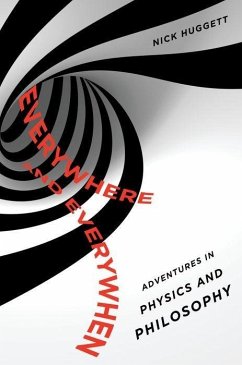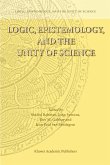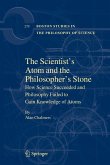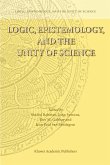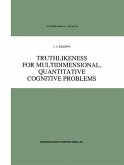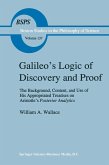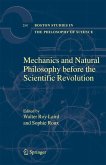- Broschiertes Buch
- Merkliste
- Auf die Merkliste
- Bewerten Bewerten
- Teilen
- Produkt teilen
- Produkterinnerung
- Produkterinnerung
This book, written for the general reader, explores the fundamental issues concerning the nature of time and space, and quantum mechanics. It shows how physics and philosophy work together to answer some of the deepest questions ever asked about the world.
Andere Kunden interessierten sich auch für
![Logic, Epistemology, and the Unity of Science Logic, Epistemology, and the Unity of Science]() Logic, Epistemology, and the Unity of Science149,99 €
Logic, Epistemology, and the Unity of Science149,99 €![The Historical Development of Energetics The Historical Development of Energetics]() Georg HelmThe Historical Development of Energetics75,99 €
Georg HelmThe Historical Development of Energetics75,99 €![The Scientist's Atom and the Philosopher's Stone The Scientist's Atom and the Philosopher's Stone]() Alan F. ChalmersThe Scientist's Atom and the Philosopher's Stone75,99 €
Alan F. ChalmersThe Scientist's Atom and the Philosopher's Stone75,99 €![Logic, Epistemology, and the Unity of Science Logic, Epistemology, and the Unity of Science]() Shahid Rahman / John Symons / Dov M. Gabbay / Jean Paul van Bendegem (eds.)Logic, Epistemology, and the Unity of Science217,99 €
Shahid Rahman / John Symons / Dov M. Gabbay / Jean Paul van Bendegem (eds.)Logic, Epistemology, and the Unity of Science217,99 €![Truthlikeness for Multidimensional, Quantitative Cognitive Problems Truthlikeness for Multidimensional, Quantitative Cognitive Problems]() I. A. KieseppäTruthlikeness for Multidimensional, Quantitative Cognitive Problems77,99 €
I. A. KieseppäTruthlikeness for Multidimensional, Quantitative Cognitive Problems77,99 €![Galileo's Logic of Discovery and Proof Galileo's Logic of Discovery and Proof]() W. A. WallaceGalileo's Logic of Discovery and Proof153,99 €
W. A. WallaceGalileo's Logic of Discovery and Proof153,99 €![Mechanics and Natural Philosophy Before the Scientific Revolution Mechanics and Natural Philosophy Before the Scientific Revolution]() Walter Roy Laird / Sophie Roux (eds.)Mechanics and Natural Philosophy Before the Scientific Revolution134,99 €
Walter Roy Laird / Sophie Roux (eds.)Mechanics and Natural Philosophy Before the Scientific Revolution134,99 €-
-
-
This book, written for the general reader, explores the fundamental issues concerning the nature of time and space, and quantum mechanics. It shows how physics and philosophy work together to answer some of the deepest questions ever asked about the world.
Hinweis: Dieser Artikel kann nur an eine deutsche Lieferadresse ausgeliefert werden.
Hinweis: Dieser Artikel kann nur an eine deutsche Lieferadresse ausgeliefert werden.
Produktdetails
- Produktdetails
- Verlag: Oxford University Press
- Seitenzahl: 234
- Erscheinungstermin: 1. Februar 2010
- Englisch
- Abmessung: 234mm x 156mm x 13mm
- Gewicht: 363g
- ISBN-13: 9780195379501
- ISBN-10: 0195379500
- Artikelnr.: 28522920
- Herstellerkennzeichnung
- Libri GmbH
- Europaallee 1
- 36244 Bad Hersfeld
- gpsr@libri.de
- Verlag: Oxford University Press
- Seitenzahl: 234
- Erscheinungstermin: 1. Februar 2010
- Englisch
- Abmessung: 234mm x 156mm x 13mm
- Gewicht: 363g
- ISBN-13: 9780195379501
- ISBN-10: 0195379500
- Artikelnr.: 28522920
- Herstellerkennzeichnung
- Libri GmbH
- Europaallee 1
- 36244 Bad Hersfeld
- gpsr@libri.de
Nick Huggett is Associate Professor of Philosophy at the University of Illinois Chicago.
1: A Longish Introduction: The Problem of Change
1.1: Melissus's Paradox
1.2: What is Change?
1.3: Laws
1.4: Spacetime Today
2: Zeno's Paradoxes: 2.1 The Dichotomy Paradox
2.2: 'Supertasks'
3: Zeno's Arrow Paradox: 3.1 The Paradox
3.2: What Philosophy Can Teach Physics
4: The Shape of Space I-Topology
4.1: An End to Space?
4.2: Neither Bounded Nor Infinite
4.3: What Physics Can Teach Philosophy
5: Beyond the Third Dimension?
5.1: Multi-Dimensional Life
5.2: More Than Three Dimensions?
6: Why Three Dimensions?
6.1: The Force of Gravity and the Dimensions of Space
6.2: Does Intelligent Life Take Three Dimensions?
6.3: Is the Universe Made for Humans?
6.4: The Megaverse
6.5: Philosophy in Physics
7: The Shape of Space II-Curved Space?
7.1: Mathematical Certainty
7.2: Life in Non-Euclidean Geometry;7.3 What Kind of Knowledge is Geometry?
8: Looking For Geometry
8.1: Measuring the Geometry of Space?
8.2: The 'Geometry' of Poincare's Space
8.3: How to Disprove a Definition
8.4: Experiencing Space: 8.5 Where is Geometry?
9: What is Space?
9.1: Space=Matter
9.2: Relational Space
9.3: Absolute Space
9.4: Relational Space Redux
9.5: What Physics and Philosophy Can Teach Each Other
10: Time
10.1: Time vs. Space
10.2: Nowism
10.3: A Moving Now?
10.4: McTaggart's Argument
10.5: Passing Time in a Block Universe
11: Time and Tralfamadore
11.1: The Mind's Worldline
11.2: Experience of Space vs. Time
11.3: Another Arrow
11.4: Physics and the Philosophy of Perception
12: Time Travel
12.1: What is Time Travel?
12.2: Is Time Travel Possible?
12.3: The Problem with Time Travel
12.4: Possible and Impossible Time Travel
12.5: The Philosophy and Physics of Time Travel
13: Why Can't I Stop my Younger Self from Time Traveling?
13.1: Physics Might Stop Me
13.2: . . . and If Not, Logic Will
13.3: My Precise Physical State Stops Me
13.4: Living in a Physical Universe
14: Spacetime and the Theory of Relativity
14.1: Photons and Bullets
14.2: Convention
14.3: Relativity-When is Now?
14.4: Relativistic Spacetime
14.5: Relativity of Length
14.6: Relativity of Time
15: Time in Relativity
15.1: The Twins
15.2: General Relativity
15.3: Time vs. Space Yet Again
16: Hands and Mirrors
16.1: Is Handedness Intrinsic or Extrinsic?
16.2: The 'Fitting' Account
16.3: Kant's Argument against the Fitting Account
16.4: Looking Left and Right
16.5: Mirrors
16.6: Orientability
17: Identity
17.1: Particle Statistics
17.2: Schr:odinger's Counting Games
18: Quarticles
18.1: New Counting Games
18.2: Hookon Identity
18.3: Indistinguishable Quarticles?
18.4: Quanta as Quarticles
19: Where Next?
1.1: Melissus's Paradox
1.2: What is Change?
1.3: Laws
1.4: Spacetime Today
2: Zeno's Paradoxes: 2.1 The Dichotomy Paradox
2.2: 'Supertasks'
3: Zeno's Arrow Paradox: 3.1 The Paradox
3.2: What Philosophy Can Teach Physics
4: The Shape of Space I-Topology
4.1: An End to Space?
4.2: Neither Bounded Nor Infinite
4.3: What Physics Can Teach Philosophy
5: Beyond the Third Dimension?
5.1: Multi-Dimensional Life
5.2: More Than Three Dimensions?
6: Why Three Dimensions?
6.1: The Force of Gravity and the Dimensions of Space
6.2: Does Intelligent Life Take Three Dimensions?
6.3: Is the Universe Made for Humans?
6.4: The Megaverse
6.5: Philosophy in Physics
7: The Shape of Space II-Curved Space?
7.1: Mathematical Certainty
7.2: Life in Non-Euclidean Geometry;7.3 What Kind of Knowledge is Geometry?
8: Looking For Geometry
8.1: Measuring the Geometry of Space?
8.2: The 'Geometry' of Poincare's Space
8.3: How to Disprove a Definition
8.4: Experiencing Space: 8.5 Where is Geometry?
9: What is Space?
9.1: Space=Matter
9.2: Relational Space
9.3: Absolute Space
9.4: Relational Space Redux
9.5: What Physics and Philosophy Can Teach Each Other
10: Time
10.1: Time vs. Space
10.2: Nowism
10.3: A Moving Now?
10.4: McTaggart's Argument
10.5: Passing Time in a Block Universe
11: Time and Tralfamadore
11.1: The Mind's Worldline
11.2: Experience of Space vs. Time
11.3: Another Arrow
11.4: Physics and the Philosophy of Perception
12: Time Travel
12.1: What is Time Travel?
12.2: Is Time Travel Possible?
12.3: The Problem with Time Travel
12.4: Possible and Impossible Time Travel
12.5: The Philosophy and Physics of Time Travel
13: Why Can't I Stop my Younger Self from Time Traveling?
13.1: Physics Might Stop Me
13.2: . . . and If Not, Logic Will
13.3: My Precise Physical State Stops Me
13.4: Living in a Physical Universe
14: Spacetime and the Theory of Relativity
14.1: Photons and Bullets
14.2: Convention
14.3: Relativity-When is Now?
14.4: Relativistic Spacetime
14.5: Relativity of Length
14.6: Relativity of Time
15: Time in Relativity
15.1: The Twins
15.2: General Relativity
15.3: Time vs. Space Yet Again
16: Hands and Mirrors
16.1: Is Handedness Intrinsic or Extrinsic?
16.2: The 'Fitting' Account
16.3: Kant's Argument against the Fitting Account
16.4: Looking Left and Right
16.5: Mirrors
16.6: Orientability
17: Identity
17.1: Particle Statistics
17.2: Schr:odinger's Counting Games
18: Quarticles
18.1: New Counting Games
18.2: Hookon Identity
18.3: Indistinguishable Quarticles?
18.4: Quanta as Quarticles
19: Where Next?
1: A Longish Introduction: The Problem of Change
1.1: Melissus's Paradox
1.2: What is Change?
1.3: Laws
1.4: Spacetime Today
2: Zeno's Paradoxes: 2.1 The Dichotomy Paradox
2.2: 'Supertasks'
3: Zeno's Arrow Paradox: 3.1 The Paradox
3.2: What Philosophy Can Teach Physics
4: The Shape of Space I-Topology
4.1: An End to Space?
4.2: Neither Bounded Nor Infinite
4.3: What Physics Can Teach Philosophy
5: Beyond the Third Dimension?
5.1: Multi-Dimensional Life
5.2: More Than Three Dimensions?
6: Why Three Dimensions?
6.1: The Force of Gravity and the Dimensions of Space
6.2: Does Intelligent Life Take Three Dimensions?
6.3: Is the Universe Made for Humans?
6.4: The Megaverse
6.5: Philosophy in Physics
7: The Shape of Space II-Curved Space?
7.1: Mathematical Certainty
7.2: Life in Non-Euclidean Geometry;7.3 What Kind of Knowledge is Geometry?
8: Looking For Geometry
8.1: Measuring the Geometry of Space?
8.2: The 'Geometry' of Poincare's Space
8.3: How to Disprove a Definition
8.4: Experiencing Space: 8.5 Where is Geometry?
9: What is Space?
9.1: Space=Matter
9.2: Relational Space
9.3: Absolute Space
9.4: Relational Space Redux
9.5: What Physics and Philosophy Can Teach Each Other
10: Time
10.1: Time vs. Space
10.2: Nowism
10.3: A Moving Now?
10.4: McTaggart's Argument
10.5: Passing Time in a Block Universe
11: Time and Tralfamadore
11.1: The Mind's Worldline
11.2: Experience of Space vs. Time
11.3: Another Arrow
11.4: Physics and the Philosophy of Perception
12: Time Travel
12.1: What is Time Travel?
12.2: Is Time Travel Possible?
12.3: The Problem with Time Travel
12.4: Possible and Impossible Time Travel
12.5: The Philosophy and Physics of Time Travel
13: Why Can't I Stop my Younger Self from Time Traveling?
13.1: Physics Might Stop Me
13.2: . . . and If Not, Logic Will
13.3: My Precise Physical State Stops Me
13.4: Living in a Physical Universe
14: Spacetime and the Theory of Relativity
14.1: Photons and Bullets
14.2: Convention
14.3: Relativity-When is Now?
14.4: Relativistic Spacetime
14.5: Relativity of Length
14.6: Relativity of Time
15: Time in Relativity
15.1: The Twins
15.2: General Relativity
15.3: Time vs. Space Yet Again
16: Hands and Mirrors
16.1: Is Handedness Intrinsic or Extrinsic?
16.2: The 'Fitting' Account
16.3: Kant's Argument against the Fitting Account
16.4: Looking Left and Right
16.5: Mirrors
16.6: Orientability
17: Identity
17.1: Particle Statistics
17.2: Schr:odinger's Counting Games
18: Quarticles
18.1: New Counting Games
18.2: Hookon Identity
18.3: Indistinguishable Quarticles?
18.4: Quanta as Quarticles
19: Where Next?
1.1: Melissus's Paradox
1.2: What is Change?
1.3: Laws
1.4: Spacetime Today
2: Zeno's Paradoxes: 2.1 The Dichotomy Paradox
2.2: 'Supertasks'
3: Zeno's Arrow Paradox: 3.1 The Paradox
3.2: What Philosophy Can Teach Physics
4: The Shape of Space I-Topology
4.1: An End to Space?
4.2: Neither Bounded Nor Infinite
4.3: What Physics Can Teach Philosophy
5: Beyond the Third Dimension?
5.1: Multi-Dimensional Life
5.2: More Than Three Dimensions?
6: Why Three Dimensions?
6.1: The Force of Gravity and the Dimensions of Space
6.2: Does Intelligent Life Take Three Dimensions?
6.3: Is the Universe Made for Humans?
6.4: The Megaverse
6.5: Philosophy in Physics
7: The Shape of Space II-Curved Space?
7.1: Mathematical Certainty
7.2: Life in Non-Euclidean Geometry;7.3 What Kind of Knowledge is Geometry?
8: Looking For Geometry
8.1: Measuring the Geometry of Space?
8.2: The 'Geometry' of Poincare's Space
8.3: How to Disprove a Definition
8.4: Experiencing Space: 8.5 Where is Geometry?
9: What is Space?
9.1: Space=Matter
9.2: Relational Space
9.3: Absolute Space
9.4: Relational Space Redux
9.5: What Physics and Philosophy Can Teach Each Other
10: Time
10.1: Time vs. Space
10.2: Nowism
10.3: A Moving Now?
10.4: McTaggart's Argument
10.5: Passing Time in a Block Universe
11: Time and Tralfamadore
11.1: The Mind's Worldline
11.2: Experience of Space vs. Time
11.3: Another Arrow
11.4: Physics and the Philosophy of Perception
12: Time Travel
12.1: What is Time Travel?
12.2: Is Time Travel Possible?
12.3: The Problem with Time Travel
12.4: Possible and Impossible Time Travel
12.5: The Philosophy and Physics of Time Travel
13: Why Can't I Stop my Younger Self from Time Traveling?
13.1: Physics Might Stop Me
13.2: . . . and If Not, Logic Will
13.3: My Precise Physical State Stops Me
13.4: Living in a Physical Universe
14: Spacetime and the Theory of Relativity
14.1: Photons and Bullets
14.2: Convention
14.3: Relativity-When is Now?
14.4: Relativistic Spacetime
14.5: Relativity of Length
14.6: Relativity of Time
15: Time in Relativity
15.1: The Twins
15.2: General Relativity
15.3: Time vs. Space Yet Again
16: Hands and Mirrors
16.1: Is Handedness Intrinsic or Extrinsic?
16.2: The 'Fitting' Account
16.3: Kant's Argument against the Fitting Account
16.4: Looking Left and Right
16.5: Mirrors
16.6: Orientability
17: Identity
17.1: Particle Statistics
17.2: Schr:odinger's Counting Games
18: Quarticles
18.1: New Counting Games
18.2: Hookon Identity
18.3: Indistinguishable Quarticles?
18.4: Quanta as Quarticles
19: Where Next?

